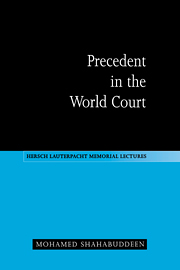Book contents
- Frontmatter
- Contents
- Foreword
- Preface
- List of abbreviations
- 1 Introduction
- 2 The growth of the Court's case law
- 3 Range of precedential resources
- 4 The bases of the system
- 5 The Advisory Committee of Jurists
- 6 The view taken by the League of Nations
- 7 The possibility of judge-made international law
- 8 Stare decisis
- 9 Distinguishing
- 10 Departing from a previous decision
- 11 Ratio decidendi and obiter dictum
- 12 Advisory opinions and decisions of chambers
- 13 The precedential impact of individual opinions
- 14 Effect and scope of the Court's case law
- 15 Conclusion
- Index
2 - The growth of the Court's case law
Published online by Cambridge University Press: 04 May 2010
- Frontmatter
- Contents
- Foreword
- Preface
- List of abbreviations
- 1 Introduction
- 2 The growth of the Court's case law
- 3 Range of precedential resources
- 4 The bases of the system
- 5 The Advisory Committee of Jurists
- 6 The view taken by the League of Nations
- 7 The possibility of judge-made international law
- 8 Stare decisis
- 9 Distinguishing
- 10 Departing from a previous decision
- 11 Ratio decidendi and obiter dictum
- 12 Advisory opinions and decisions of chambers
- 13 The precedential impact of individual opinions
- 14 Effect and scope of the Court's case law
- 15 Conclusion
- Index
Summary
Increase in the relative importance of case law
The World Court, existing first as the Permanent Court of International Justice and currently as the International Court of Justice, has been in existence for nearly three-quarters of a century. The prospect of the Court building up its own case law and the practical implications of this for the international community had been the subject of early notice, going back to the period leading up to the establishment of the first Court. Following on its establishment, one finds that the precise extent of the possible precedential value of Status of Eastern Carelia underlay much of the debate relating to the question of United States accession to the Protocol of Signature of the Statute of the Permanent Court of International Justice. Writing on the issue in 1926, Sir Cecil Hurst advised the British Secretary of State for Foreign Affairs as follows:
How far the rule embodied in this decision of the Court extends is a question which at the present time it is impossible to answer. All that it is possible to do, therefore, with regard to complying with the United States condition is to refer to the Eastern Carelia case. The Court will gradually build up a rule of law on this point out of the decisions which it gives, as no doubt such successive decisions will constitute precedents in the same way that the successive decisions of the English courts in early times have built up the Common Law of England. […]
- Type
- Chapter
- Information
- Precedent in the World Court , pp. 13 - 31Publisher: Cambridge University PressPrint publication year: 1996

